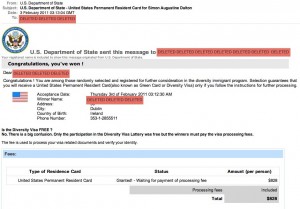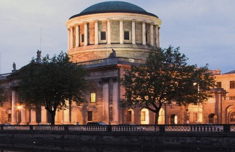On 24 January 2011, the Supreme Court gave permission to appeal in the case of Flood v Times Newspapers. Lords Hope, Brown and Mance originally proposed to grant permission on the condition that the “Times” agreed to pay Mr Flood’s costs in any event but the Court has now granted permission unconditionally. We commented on the Court of Appeal decision at the time and other discussions of it can be found in the “Table of Recent Cases” above. There is a report on the initial permission decision in the Press Gazette.
The empty chair and the moratorium: broacasters’ duties of fairness – II
 I enjoy political debate; and I particularly enjoy political debates on television between political party leaders. I will therefore be a happy spectator tomorrow night when TV3 host the first such leaders’ debate of the current election campaign. But, as things now stand, Enda Kenny, the leader of Fine Gael, the party which is leading in all of the polls, will not participate. One of the consequences of his refusal to do is that he has made the broadcaster part of the story, and not simply the means by which the political story reaches us, the viewing public. (It’s not the only example of the broadcaster being the story this week: there was a spat between Newstalk and RTÉ; and there were calls for a deputy leaders’ debate and a women’s debate). As a general rule, it’s not a good thing when the broadcaster becomes part of the story; it means something has gone awry with the normal functioning of the political process. When that happens, people often reach for their lawyers. Last week, a leading member of Kenny’s party suggested that having the debate without Kenny (perhaps with an empty chair to symbolize his absence) would breach TV3’s statutory duty of impartiality.…
I enjoy political debate; and I particularly enjoy political debates on television between political party leaders. I will therefore be a happy spectator tomorrow night when TV3 host the first such leaders’ debate of the current election campaign. But, as things now stand, Enda Kenny, the leader of Fine Gael, the party which is leading in all of the polls, will not participate. One of the consequences of his refusal to do is that he has made the broadcaster part of the story, and not simply the means by which the political story reaches us, the viewing public. (It’s not the only example of the broadcaster being the story this week: there was a spat between Newstalk and RTÉ; and there were calls for a deputy leaders’ debate and a women’s debate). As a general rule, it’s not a good thing when the broadcaster becomes part of the story; it means something has gone awry with the normal functioning of the political process. When that happens, people often reach for their lawyers. Last week, a leading member of Kenny’s party suggested that having the debate without Kenny (perhaps with an empty chair to symbolize his absence) would breach TV3’s statutory duty of impartiality.…





